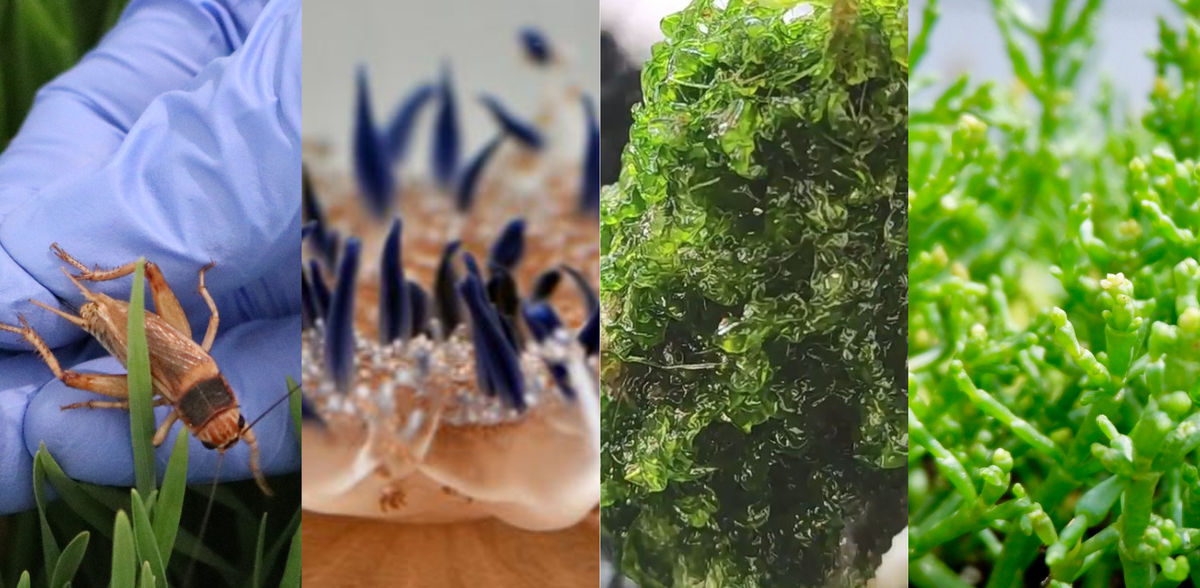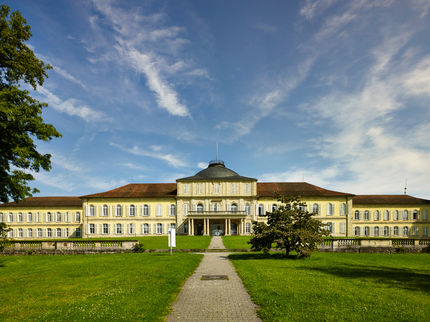food4future enters second funding phase
Sustainable agricultural systems for urban nutrition
Advertisement
How can future generations be sustainably supplied with healthy food? This is the focus of the joint project "food4future - Food of the Future". It is funded by the Federal Ministry of Education and Research as part of the "Agricultural Systems of the Future" funding line and entered phase two in October 2024. Under the leadership of Prof. Dr. Monika Schreiner (IGZ), it is researching how alternative food sources can be cultivated sustainably and integrated into urban food systems. At the industry and transfer workshop on March 31 and April 1, 2025 in Potsdam, "food4future" presented key results to interested representatives from science, industry and politics.

Dr. Anna Fricke (IGZ) demonstrates to PStS. Claudia Müller (BMBF/BMEL) demonstrates the lighting unit for indoor macroalgae culture.
Agrarsysteme der Zukunft
NEW PATHS FOR URBAN AGRICULTURAL SYSTEMS
In "food4future", scientists from nine institutions are researching how alternative food sources can be produced directly in cities using innovative cultivation systems. They are developing sustainable concepts for the cultivation and processing of macroalgae, salt plants, jellyfish and crickets for food production. The focus is also on modular indoor cultivation units made from new materials that are resource-efficient and flexible in use.
Prof. Dr. Monika Schreiner explains: "The challenges of sustainable agricultural and food systems require radical scientific innovation and interdisciplinary cooperation. In "food4future", we are developing experimentally supported solutions for urban food production that integrate biotechnological, ecological and social perspectives." Another key component is the use of digital technologies. Interactive visualizations are intended to make the scientific findings comprehensible and promote the transfer of knowledge.
MACROGEN RESEARCH AND PROJECT COORDINATION
At the Leibniz Institute of Vegetable and Ornamental Crops (IGZ), the network coordination focuses on the strategic networking and further development of the project as well as on social dialogue. The researchers are developing innovative methods for the indoor cultivation of macroalgae as well as approaches for efficient, joint cultivation with salt plants, jellyfish and insects. Results to date show that regional brine water can be used for land-based indoor cultivation in the same way as seawater, meaning that non-coastal indoor cultivation systems are also possible.
START OF THE SECOND FUNDING PHASE
With the start of the second funding phase in October 2024, the focus of the joint project is on scaling up and testing the technologies developed for urban food production in practice. Researchers will test and optimize cultivation prototypes in the "food4future living lab" real-world laboratory in order to optimize the scalability and economic viability of the innovations and to shape the transition from basic research to practice. In addition, the scientists are expanding the range of cultivable species and researching the use of residual materials to close cycles.
A relevant step towards implementation was the industry and transfer workshop of the BMBF's "Agricultural Systems of the Future" program on 31 March and 1 April 2025 in Potsdam. The project's innovations were presented and discussed here in order to set the course for a successful market launch.
FUNDING AND PARTNER INSTITUTIONS
"food4future - Food of the Future" is being funded for four years with around five million euros as part of the BMBF's "Agricultural Systems of the Future" funding line. The consortium under the leadership of Prof. Dr. Monika Schreiner (IGZ) consists of:
- German Institute of Human Nutrition Potsdam-Rehbrücke (DIfE)
- Fraunhofer Institute for Applied Polymer Research IAP
- Berlin University of Applied Sciences
- Leibniz Institute for Agricultural Engineering and Bioeconomy (ATB)
- Leibniz-Institute of Vegetable and Ornamental Crops (IGZ) - Project Coordination
- Leibniz Centre for Tropical Marine Research (ZMT)
- Wildau University of Applied Sciences
- Thünen Institute of Farm Economics
- University of Bayreuth
Note: This article has been translated using a computer system without human intervention. LUMITOS offers these automatic translations to present a wider range of current news. Since this article has been translated with automatic translation, it is possible that it contains errors in vocabulary, syntax or grammar. The original article in German can be found here.






























































